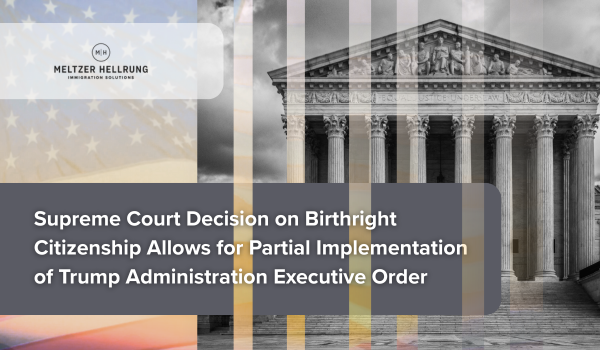We will not know the full extent of the Trump Administration’s immigration plans for another couple of months. However, we are predicting actions that may be likely based on the first Trump administration’s policies in 2017-2021 and the information available in the Heritage Foundation’s Project 2025 publication. Please join us as we preview actions the Trump Administration may take in 2025, the impact on businesses and employees, and actions we can take to prepare.
Issue #4: Visa Reciprocity Changes
What is the Policy?
Visa reciprocity is a policy under which two countries treat each other’s nationals similarly for visa processing purposes. In the U.S., the Department of State (DOS) is required by statute to implement visa reciprocity when deciding which country-specific fees and conditions to impose on nonimmigrant visas. DOS should impose similar fees and conditions that those countries impose on U.S. nationals. DOS publishes reciprocity tables, showing country-specific visa details (fees, duration, number of entries allowed, documents required).
Advocates connected to the Trump administration have alleged that DOS fails to strictly enforce visa reciprocity. They claim that certain countries grant U.S. nationals unfavorable visa conditions, or are even hostile to U.S. interests and nationals, but still enjoy favorable U.S. visa rights – despite clear evidence to the contrary. These advocates have called for strictly enforcing mandatory reciprocity in visas for all foreign nationals.
We predict that DOS will more closely review its visa reciprocity tables, and will restrict or burden U.S. nonimmigrant visa access for nationals of countries considered to be offering unfavorable visa rights for U.S. nationals, or otherwise considered to be at odds with U.S. interests.
Why Would the Trump Administration Implement This Policy?
The first Trump administration in 2017 announced its intention to enforce stricter visa reciprocity in the name of national security. Subsequently in 2019 DOS significantly changed visa reciprocity schedules for many countries. Some changes were unexpected and unfavorable to those countries’ nationals. The second Trump administration would likely again take this action under the same rationale.
Because country-specific visa fees and conditions are merely policies, not regulations, DOS can change them quickly and without significant administrative burden.
How to Prepare
U.S. employers and their employees on nonimmigrant visas should regularly review DOS’ reciprocity tables to watch for changes in visa fees, validity periods, number of entries permitted, and documentation required. To receive individualized advice, and to learn how Meltzer Hellrung’s Consular Processing Services package can ease the visa application burden, speak to your designated Meltzer Hellrung attorney.


